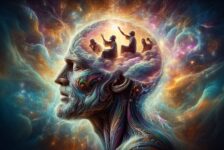A 2009 study by the National Institutes of Health cognitive neuroscience program found that the human brain makes no distinction between how it perceives deities or humans. “God” seemed to have the same effect on the human brain as that of any other human, activating the same areas of brain function that humans use to decipher the emotions, thoughts and intentions of other people. Further results were published in 2014 and 2022, with data from religious and irreligious individuals.
Brain activity is heavily influenced by culture, evolution, and the respective development of better cognitive and cultural functions, all of which play a role in comprehending religious belief.
Religious experiences are felt and interpreted via a complex interconnection of different sections of the brain, and researchers use functional neuroimaging to map these religious belief-related brain regions and networks. Studies also examined lesion mapping and seeking correlations between religious extremism and fundamentalism in areas of damage which could provide clues about their neural underpinnings. Numerous scientific, sociological, and cultural issues may benefit from an understanding of the psychological and neurobiological mechanisms underlying religious extremism.
Further, recent findings demonstrate that the co-active brain regions for religious beliefs are comparable with those that activate for political beliefs. Religious or irreligious, conservative or liberal? The brain does not have any difference. Science illustrates the fact that religions and ideologies aren’t scientifically different, and that politics, economics, and cultures are involved in the process of beliefs. In summary, experiences of the supernatural…are just brain chemistry.


